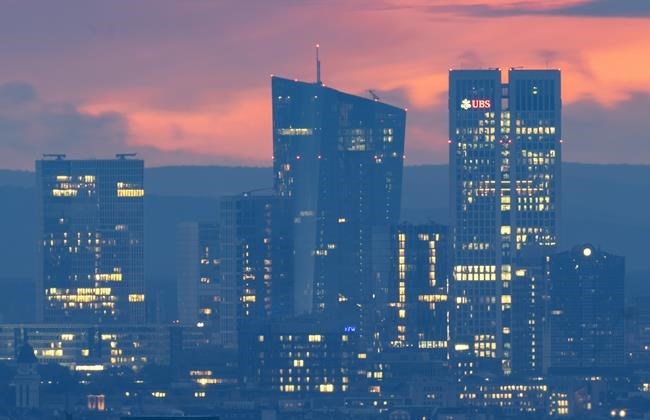FRANKFURT, Germany (AP) — The European Central Bank left interest rates unchanged Thursday for the first time in over a year as the Israel-Hamas war spreads even more gloom over already downbeat prospects for Europe’s economy.
It is the bank's first meeting with no change after a torrid pace of 10 straight increases dating to July 2022 that pushed its key rate to a record-high 4%. The ECB joins the U.S. Federal Reserve, Bank of England and others in holding borrowing costs steady — albeit at the highest levels in years — as inflation has fallen.
ECB President Christine Lagarde pointed to a “broad based” decline in inflation to 4.3% in September, with fuel costs dropping and spikes in food prices easing. She reiterated that high rates would help drive back inflation to the bank's goal of 2% if “maintained for a sufficiently long duration.”
She would not say how long that might take but told reporters in Athens, where the bank held one of its regular meetings away from its Frankfurt headquarters, that “even having a discussion on cuts is totally, totally premature."
Lagarde also did not rule out further rate increases, depending on how the fight against inflation progresses, saying, “I am not going to pass a judgment to say we are at peak."
The ECB's “message seems clear,” Holger Schmieding, chief economist at Berenberg bank, said in an analyst note. “In the absence of any major surprise, rates will stay at their current levels for the foreseeable future.”
Inflation peaked at a painful 10.6% in October for the 20 countries that use the euro currency as Russia's war in Ukraine took a toll. Those high prices have been poison for consumer spending, draining household finances with added costs for necessities such as food, heat and electricity.
With inflation down considerably, worries now are sharpening about weakening economic growth and even the risk of a recession. Rate hikes are a central bank’s chief weapon against inflation, but they can weigh on economic growth by raising the cost of credit for consumer purchases, particularly homes, and for companies to buy new equipment and facilities.
Lagarde noted that the economy was expected to stay weak through the end of the year, while the wars in Ukraine and the Middle East could create uncertainty about the future and further hurt economic growth in Europe.
Surveys of purchasing managers by S&P Global indicate that economic activity fell in October. Analysts at ABN Amro bank foresee a 0.1% drop in economic output in the eurozone for the July-to-September quarter and minus 0.2% for the last three months of the year. The EU will publish third-quarter figures on Tuesday.
Inflation's impact on consumers was a big reason why Europe has seen almost no growth this year, recording zero in the first quarter and 0.2% in the second. Its biggest economy, Germany, is forecast by the International Monetary Fund to shrink by 0.5% this year, making it the world's worst performing major economy. Even Russia is expected to grow this year, the IMF says.
And there's little prospect of improvement for Europe this year.
The war in the Middle East has threatened to raise oil prices, though there hasn't been a major spike or an interruption in supplies so far. But the conflict adds uncertainty because Europe is heavily dependent on imported energy, which could be affected if the Israel-Hamas war widens to include Iran or its proxy fighters in Arab countries.
“The ECB has never been more worried about the growth outlook,” said Carsten Brzeski, global head of macro at ING bank. The bank also seems “relatively relaxed about potential new inflation waves stemming from oil prices."
As a result, he said he expects Thursday's rate pause "to eventually be seen as the end of the hiking cycle.”
___
This story has been corrected to show that Europe has seen almost no growth this year, recording zero in the first quarter and 0.2% in the second, not 0.1% growth in the first two quarters of this year.
David Mchugh, The Associated Press


